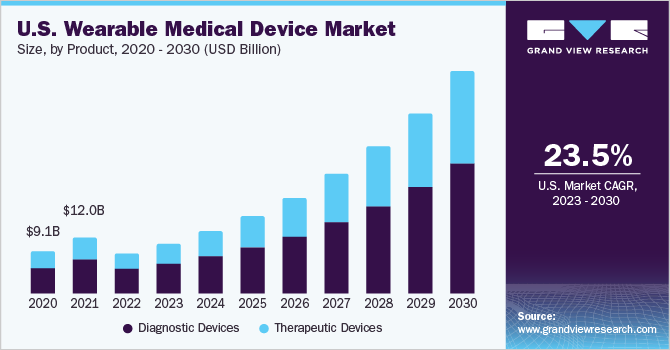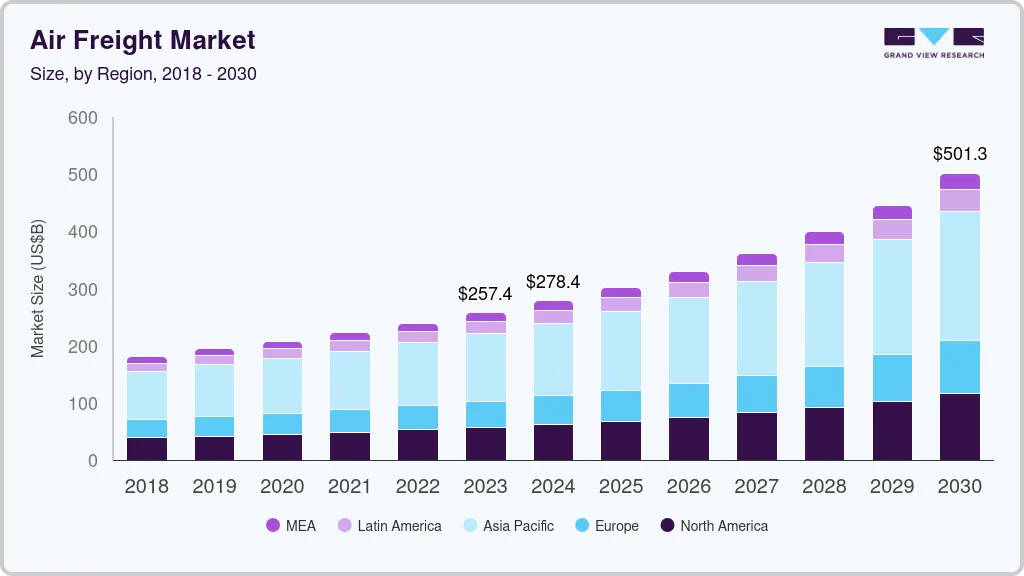Wearable Medical Device Industry Overview
The global wearable medical device market size was valued at USD 21.3 billion in 2021. It is expected to expand at a compound annual growth rate (CAGR) of 28.1% from 2022 to 2030. The growth of industries such as home healthcare and remote patient monitoring devices is anticipated to influence market growth. In addition, increasing focus on fitness and a healthy lifestyle orientation are also expected to impact the market. A surge in product demand during the COVID-19 pandemic and increasing awareness about personal health monitoring are expected to be some of the major market drivers.

Also, due to the sedentary routine, the incidence and prevalence of lifestyle-associated disorders, such as diabetes and hypertension, are projected to increase over the forecast period. Some of these diseases demand continuous monitoring of several physiological parameters, for instance, blood sugar levels and blood pressure. This allows the amalgamation of healthcare data with portable medical devices, which can then be forwarded to physicians to have real-time access to data and minimize errors. Moreover, the rising mortality rate due to non-communicable diseases is the major reason for concern demanding more focus on personalized monitoring and care. This is ultimately anticipated to further increase the demand for wearable medical products.
Gather more insights about the market drivers, restraints, and growth of the Global Wearable Medical Device market
The outbreak of the COVID-19 pandemic has extended the role of wearable medical devices in the healthcare trade. Various companies are entering the landscape, with innovative wearable products that can help detect the early warning signs of viral infections. For example, Ava Bracelet, which is primarily used as a fertility tracker, is now being leveraged to help in combating the coronavirus. This bracelet tracks heart rate variability, breathing rate, and skin temperature making it useful in tracking symptoms of the virus. This offers a unique opportunity during this pandemic.
The rising prevalence of chronic diseases along with increasing mortality rates is a major area of concern among people as well as government organizations. Thus, healthcare providers are offering personalized care including continuous and remote patient monitoring. Also, these can be worn for 24 hours without affecting the routine life. Hence, considering the various advantages that it offers, the demand for wearable medical devices is projected to boost over the forecast period.
Increasing attention on fitness is a high-impact rendering driver for the market. Various wearable medical products and software have been developed for the management of weight and fitness. Usually, wristbands are connected with cell phones that display real-time tracking of activities such as steps walked, calories burned, calorie intake, miles a person ran, etc. By compiling all the data together, vital information such as the body mass index is obtained. The regular study of these statistics helps in providing a good health plan to individuals as well as healthcare professionals. Also, the fitness club count is seen increasing in recent years. According to the 2019 IHRSA Global Report, there are around 183 million users of fitness clubs globally.
Browse through Grand View Research's Medical Devices Industry Research Reports.
Home Healthcare Market - The global home healthcare market size was valued at USD 336.0 billion in 2021 and is expected to expand at a compound annual growth rate (CAGR) of 7.93% from 2022 to 2030.
Remote Patient Monitoring System Market - The global remote patient monitoring system market size was valued at USD 4.4 billion in 2022 and is expected to register a compound annual growth rate (CAGR) of 18.5% over the forecast period.
Wearable Medical Device Market Segmentation
Grand View Research has segmented the global wearable medical devices market based on product, site, application, and region:
Wearable Medical Devices Product Outlook (Revenue, USD Billion, 2018 - 2030)
- Diagnostic Devices
- Therapeutic Devices
Wearable Medical Devices Site Outlook (Revenue, USD Billion, 2018 - 2030)
- Handheld
- Headband
- Strap/Clip/Bracelet
- Shoe Sensors
- Others
Wearable Medical Devices Application Outlook (Revenue, USD Billion, 2018 - 2030)
- Sports And Fitness
- Remote Patient Monitoring
- Home Healthcare
Wearable Medical Device Regional Outlook (Revenue, USD Billion, 2018 - 2030)
- North America
- Europe
- Asia Pacific
- Latin America
- Middle East & Africa
Market Share Insights
November 2020: Royal Philips and African Union announced a partnership to strengthen healthcare infrastructure and enhance access to care in African Union Member States by improving access to medical equipment.
November 2020: Royal Philips announced the introduction of Philips Ventilator BiPAP A40 EFL. This initiative would help the company in expanding its home healthcare portfolio for COPD patients.
Key Companies profiled:
Some prominent players in the global Wearable Medical Device market include -
- Philips Electronics
- Fitbit
- Basis Science
- Garmin
- Covidien
- Omron Corp.
- Withings
- Vital Connect
- Polar Electro
- Intelesens
- Everist Genomics
- Intelesens
- Sotera Wireless
Order a free sample PDF of the Wearable Medical Device Market Intelligence Study, published by Grand View Research.


No comments:
Post a Comment